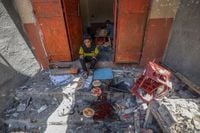Dozens of US House Democrats have urged Israel to resume the flow of humanitarian aid to the Gaza Strip, expressing their deep concern over the ongoing blockade that has exacerbated the humanitarian crisis in the region. In a letter addressed to Israeli Ambassador to the US Yechiel Leiter on May 7, 2025, the lawmakers stated, "As supporters of a strong US-Israel relationship, we write to express our opposition to the current Israeli government policy to block all humanitarian aid from entering the Gaza Strip." They emphasized their alarm regarding Israel's humanitarian blockade, which has persisted since March 2, 2025, effectively closing Gaza’s crossings to essential supplies like food and medical aid.
Since the onset of the conflict on October 7, 2023, over 52,600 individuals—predominantly women and children—have lost their lives in Gaza. The situation has drawn increasing criticism from various lawmakers, including Senator Bernie Sanders, who have called for the US government to reconsider its support for Israel amidst allegations of complicity in the humanitarian crisis.
Meanwhile, Israel has announced plans to intensify its military operations in Gaza, which include the indefinite seizure of large territories and the forced displacement of its population. Israeli officials have proposed a controversial plan to take over aid distribution in Gaza, shutting down the existing UN-led system and replacing it with a new framework that many humanitarian organizations fear will weaponize aid as part of a military strategy.
Reports indicate that the Israeli initiative aims to confine Gaza’s population into areas deemed "clean of Hamas" while establishing military-guarded aid distribution hubs. This plan has sparked outrage among humanitarian groups, who argue that it violates fundamental humanitarian principles and is designed to reinforce control over essential supplies.
"The design of the plan presented to us will mean large parts of Gaza, including the less mobile and most vulnerable people, will continue to go without supplies," stated a representative from the UN’s emergency aid coordinating body, OCHA. The plan involves allowing only one member of each family to approach the hubs to collect assistance, which would be communicated via text message once or twice a month. Critics have pointed out that the logistics of this plan are impractical, given the dire conditions on the ground.
As of now, the maximum number of aid trucks permitted to enter Gaza is capped at 60 per day, despite humanitarian organizations estimating that at least 500 trucks are necessary to meet the needs of the population. The World Food Programme recently announced that it had depleted its stocks, while World Central Kitchen confirmed that it had run out of supplies for cooking meals and baking bread.
Conditions in Gaza are dire, with reports indicating that at least 60,000 children are malnourished. UNICEF has also reported that more than 9,000 children have been admitted for treatment of acute malnutrition since the beginning of the year. The ongoing blockade and military operations have contributed to widespread hunger and suffering among the populace.
In a recent communication, a staff member from the charity INARA described the heartbreaking reality of food scarcity in Gaza, stating, "The hunger is everywhere, and it’s real. It’s everywhere." The situation has become so severe that families are forced to ration their limited food supplies, with some even resorting to grinding up pasta to make dough due to the lack of flour.
Amidst these challenges, the Israeli government has been criticized for its handling of the aid distribution process, with many arguing that its refusal to establish a viable alternative to Hamas has allowed the organization to maintain a stronghold in Gaza. An Israeli official noted that the IDF recognizes that Gazans are "nearing starvation" and indicated that aid would resume in the coming days or weeks, but only under the strict conditions outlined in the new plan.
Despite the Israeli government's assurances, skepticism remains regarding the effectiveness and humanitarian nature of the proposed aid distribution hubs. An international aid group staffer expressed concerns that the initiative does not accurately reflect the current reality in Gaza, where desperate citizens are likely to overwhelm the aid hubs once they open.
As the humanitarian crisis in Gaza deepens, the international community continues to grapple with the implications of the ongoing conflict. The US House Democrats' letter serves as a reminder of the growing calls for a reevaluation of US support for Israel, particularly in light of the escalating humanitarian disaster.
In conclusion, the situation in Gaza remains precarious, with millions of individuals facing extreme deprivation and uncertainty. The proposed changes to aid distribution, while aimed at addressing some of these challenges, have raised significant concerns among humanitarian organizations and advocates for the rights of those affected by the conflict.

